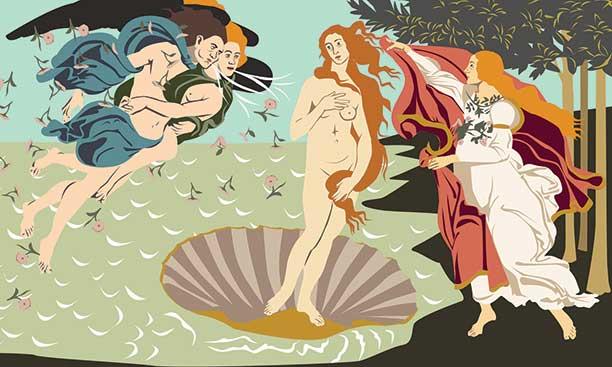
If the devil can cite Scripture for his purpose, what can one say about Roosh V’s use of Aristotle?
On the surface, not much, argues classicist Donna Zuckerberg *14 in her new book, Not All Dead White Men: Classics and Misogyny in the Digital Age (Harvard University Press). She has little regard for his knowledge of classics, but says his broader influence, and that of his allies, is pernicious nonetheless. Daryush Valizadeh — “Roosh V” to his fans — is a star of the far-right blogosphere where, among other things, the ancients are used to support misogyny and white supremacy. Among his posts over the last dozen years are offerings titled “10 Reasons Why Heterosexual Men Should Leave America” and “The Accusation That I’m A Rapist Is A Malicious Lie.”
Roosh V is concerned about our intellectual future and what left-wing activists want to do to it. In an October 2014 post titled “What Is A Social Justice Warrior (SJW)?” he imagined the argument they would make: “Even if Aristotle, Seneca, Marcus Aurelius, Thomas Aquinas, or Henry David Thoreau had valuable wisdom that continues to help how millions of people live today, the information derived from their work must be completely discarded since they were white men.”
Not only is that a gross distortion of progressive views, Zuckerberg counters, Roosh V’s use in other posts of, say, the Roman poet Ovid to provide a historical pedigree for sexual assault is just as ignorant and sinister. Browsing through Roosh V’s writings, one can find numerous musings on the lessons to be learned from ancient literature about the proper role of women, few of which could be quoted in this magazine.
Still, one might ask, so what? Rebutting every dark corner of the internet is a game of whack-a-mole. Nevertheless, Zuckerberg contends, there is cause for alarm.
Most people who defend the study of classics are not extremists, of course. The Founders turned to classical texts for inspiration on how to build everything from a house to a government. Countless others have looked to Greco-Roman art and literature for their grace, insight, and eloquence.
In many cases, though, modern writers seem to focus on the ancients less for inspiration than validation. “But for Greece,” wrote the poet Percy Bysshe Shelley in 1822, “Rome, the instructor, the conqueror, or the metropolis of our ancestors, would have spread no illumination with her arms, and we might still have been savages and idolaters; or, what is worse, might have arrived at such a stagnant and miserable state of social institution as China and Japan possess.” That’s a little more eloquent than Roosh V might have put it, but is it all that different?
To pick a more modern example, in 1998, classicists Victor Davis Hanson and John Heath published Who Killed Homer: The Demise of Classical Education and the Recovery of Greek Wisdom, sounding the alarm that ancient verities are being erased in the name of political correctness. Embedded within the academic discipline of classics, they wrote, “are the ideas and values that have shaped and defined all of Western civilization.”
The legacy they purport to defend, however, is more complicated, and often much less lovely, than writers like Hanson and Heath make out. Zuckerberg points out that those classical “ideas and values” have also included slavery, imperialism, nationalism, and the subjugation of women. European writers in the 19th century used ancient sculptures to promote pseudo-scientific racial hierarchies, while Hitler and Mussolini embraced them in defense of a white master race.
Zuckerberg argues that adherents of the alt-right — defined by the Anti-Defamation League as those on the extreme right who favor “forms of conservatism that embrace explicit racism or white supremacy” — are simply the latest group to wrap themselves in the classical mantle as defenders of a Western tradition fashioned to serve their own prejudices. The neo-Nazi group Identity Evropa (the “v” imitates the way Romans carved the letter “u”) drapes its website with pictures of Greek and Roman sculptures and bills itself as “a group of patriotic American identitarians who have realized that we are descended from the great traditions, history, and people that flowed from Europe.” Its members led the tiki-torch march in Charlottesville, Va., in 2017, after which group member James Allsup wrote, “We were defended by the President of the United States because he knew that our ideas are, in fact, normal.”
Or consider Steve Bannon, the Breitbart founder and former White House strategist, who is so interested in the Peloponnesian War that he reportedly adopted “Sparta” as his computer password. As assistant classics professor Dan-el Padilla Peralta ’06 puts it, “Once you have someone like a Steve Bannon exploiting Thucydides, or at least posturing himself as a reader of Thucydides, you’re no longer talking about a discursive practice that is on the margins.”
That, Zuckerberg says, is why these bloggers matter.
What makes modern classical appropriation different than in the past, she continues, is the alt-right’s ability to popularize the idea that ancient Greeks and Romans “are our ancestors as white people,” she writes. “Not only do they see themselves as the inheritors of the classics, they see themselves as their defenders.”
Who owns the ancient world, and whose story does it tell? These questions seem more pressing now than they have been for some time. Zuckerberg argues that they’re pointed questions for her fellow classicists, as well, who must re-examine their academic discipline, its legacy, and continuing relevance.
An independent scholar living in the Bay Area (and sister of Facebook founder Mark Zuckerberg), Zuckerberg founded the website Eidolon (eidolon.pub) in 2015 to promote a freewheeling discussion of classics by academics and non-academics alike. “Eidolon,” she wrote in a 2017 mission statement, “makes the classics political and personal, feminist and fun.” Women make up the site’s entire editorial board.
Articles on Eidolon add to scholarly debates, but often in a more lighthearted way than one might find in, say, the journal Classical Philology. Earlier this year, for example, Vassar professor Tara Mulder wrote about Tiresias (the blind poet in Greek mythology) and female pleasure, a story that received nearly 5,000 positive reviews from readers. Yung In Chae ’15, an editor-at-large for Eidolon, has written on topics ranging from “Women Who Weave: Reading Emily Wilson’s Translation of the Odyssey with Margaret Atwood’s The Penelopiad” to “White People Explain Classics to Us.”
It is Zuckerberg’s fight against the far right that has brought her to a broader audience. She began writing about the issue on Eidolon in 2015, and she paid for the attention by being subjected to heaps of online abuse, even while she could hardly get her fellow classicists to take bloggers like Roosh V seriously. She submitted a draft of her book a week before the 2016 presidential election. “And then,” she recalls, “everything turned on a dime. Suddenly everyone was talking about the alt-right.”
Zuckerberg prefers to tag these alt-right groups with a name they have given themselves, particularly those on the social-networking site Reddit: the Red Pill. It turns out that a subculture that extols the wisdom of ancient literature took its name from The Matrix, the 1999 film about a world in which humanity is chained to an alternative reality by a totalitarian state. Morpheus (played by Laurence Fishburne) offers Neo (Keanu Reeves) two pills and a choice: Swallow the blue pill and remain in ignorance, or swallow the red pill and see the true state of the world around him.
The Red Pill, Zuckerberg says, believes that multiculturalists, globalists, feminists, and political-correctness scolds keep our society in a similar state of slavery. Like the characters in the film, members of the Red Pill believe that only they can see things as they really are, often with the guidance of classical authors. The Red Pill forum had 260,000 members before Reddit “quarantined” it last September for its offensive content. Zuckerberg, citing self-reported surveys, says members are predominantly white, heterosexual American men between the ages of 18 and 35, politically conservative, and with no strong religious affiliation.
Zuckerberg, whose book analyzes the growth, history, and influence of classical appropriation by the far right, devotes two chapters to particular examples of ancient wisdom the Red Pill believes have been wrongly purged from modern society. One is Stoicism, the ancient philosophy emphasizing self-improvement and a dispassionate view of the world. Marcus Aurelius’ Meditations, one of the essential Stoic texts, is a particular favorite, but to the Red Pill Stoicism is more of a life-hack — a set of handy rules for getting ahead, developing self-discipline, and dismissing as irrational women, minorities, and anyone who fights for social justice.
Though their grasp of Stoicism is superficial, Zuckerberg writes, embracing it elevates the image of members of the Red Pill “from a group of angry white men to the only people brave enough to speak truth to power. By quoting Stoic texts, they project the appearance of emotional control, which allows them to rhetorically establish their superiority over groups they perceive as angry.”
She devotes another chapter to ways the Red Pill uses Ovid’s Ars Amatoria, a long love poem written in the year 2 A.D., as a modern guide for developing the confidence, insight, and patter to woo women — skills adherents call “having game.”
“Having game,” Zuckerberg writes, “is about being the kind of man women want, and pickup artists believe that women have always wanted and will always want the same thing: an ‘alpha male’ to provide for them and father their children.” Leaving aside the debatable proposition of whether “having game” actually attracts women, Zuckerberg sees dangerous undertones in promoting Ovid’s seduction manual as a way to subvert modern culture, which Red Pill members believe is stacked against them and in favor of women.
Classical scholars who have challenged the Red Pill on these points have been met with condescension and abuse, though Zuckerberg says the online vitriol she has faced has abated. She still checks what the trolls are saying about her during early-morning feedings for her new baby, but says that motherhood has given her an ability to see the internet’s corrosiveness and acrimony with better perspective. Still, she cautions, it is important to fight back against Red Pill arguments because of a blurring line between the alt-right and what she calls the “alt-lite,” more mainstream conservative organizations that take these distortions and spread them into wider circulation. Fringe ideas, for example, may pass from the dark web (internet sites hidden from normal search engines ) to right-wing radio host Alex Jones and then to commentators on Fox News, Zuckerberg says.
Throughout much of modern history, knowledge of Latin and Greek was a signifier of wealth and status. Some on the left concede the point that classics are only meaningful to “reactionary white men,” Zuckerberg says, citing student protesters at Reed College who denounced the core humanities course, which included several classical authors, for promoting Eurocentrism. “Both sides of the debate,” she notes, “agree that the study of ancient literature perpetuates white male supremacy; they differ only on the question of whether that is a consequence that should be celebrated.” Knowledge of classics and classical languages is a sign of erudition and prestige even today. Classicists, Zuckerberg says, benefit from their privilege even as they denounce it.
Accordingly, while Zuckerberg’s fight with the far right gets all the attention, with reviews in Time and The Atlantic among many other places, she does not spare her own colleagues, many of whom accept the premise that “classics” are the foundation of “Western civilization” without stopping to question what those terms mean. “‘Western civilization’ is not a monolith,” her colleague Chae observes, but in fact drew on a much wider range of influences across the Mediterranean, Middle East, and North Africa. Padilla Peralta asks whether academics should continue to perpetuate the view that our modern society rests on the shoulders of “dead white men,” something he calls “as much of an ethical question as a pedagogical one.”
Zuckerberg advocates changing the way much of classical history and literature are taught, emphasizing the great diversity of the ancient world. Contrary to the alt-right, our modern definitions of race would have meant nothing to the Greeks and Romans, though they, too, were obsessed with group identity. The hair and skin on many classical statues were originally painted, and Sarah Bond, an assistant classics professor at the University of Iowa, half-seriously proposes repainting them to point out how different ancient people looked from the visages we see today in white marble.
Padilla Peralta believes that any study of classics must include an accounting of how ancient literature has been used to justify oppression, including slavery. In the spring of 2017 he taught a course that examined the concepts of citizenship and slavery from the ancient world to the 21st century. Going further, he points out that even the name “classics” seems to trumpet the discipline’s superiority; in response, some universities have renamed their classics departments as departments of Greek and Roman studies. Padilla Peralta suggests that Princeton consider doing the same.
Although enrollment levels remain steady, Andrew Feldherr ’85, chair of the Princeton classics department, says he and his colleagues are trying to attract students with different backgrounds and expectations. (See sidebar, at left.) “The study of Greece and Rome doesn’t have the same kind of immediate recognition and prestige it used to have,” he concedes. “I think that is a good thing. What we’re realizing now is that we have to find students who don’t know what the discipline can offer.”
There is a Western intellectual tradition that gives these ancient works continued relevance, Feldherr says, although that tradition and its meaning are not the property of any single group. “These are texts that have mattered in the West, but their value is much more than a legacy or even the long conversation about these ideas. Reading Homer is a good preparation for reading Virgil, and reading Virgil is a good preparation for reading Dante or even Joyce.”
Most students, of course, will not go on to read any of those other writers, but there are good reasons, Feldherr believes, why The Iliad remains on many high school and college reading lists: “There is value in reading that as a first text because it is something that, for historical reasons, will seem very familiar. And yet it’s not familiar. It’s an almost 2,000-year-old poem written for a society we would not feel at home in. So the experience of looking at something that you may have these preconceptions about and discovering how radically different it is provides an experience that should be at the start of everybody’s education.”
Zuckerberg doesn’t dispute that our society owes a debt to the Greeks and Romans. The question, she says, is what we do with it. “Should we romanticize the debt, as Shelley did, and as one can find men on Red Pill websites doing today? Or is it a more complicated and problematic legacy? And if the Greeks really are not as similar to us as [earlier generations] thought, would that difference make them less worth reading?”
Mark F. Bernstein ’83 is PAW’s senior writer.






4 Responses
George Gurley ’63
6 Years AgoCase For The Classics
Donna Zuckerberg *14 (feature, Jan. 9) tries to make a case that “the classics” are threatened by the alt-right and someone who calls himself “Roosh V.” But her attempt to demonize these fringe entities comes across as a straw-man argument to justify another recitation of clichés about “dead white males” and the sins of classical cultures, such as slavery and misogyny, historically commonplace practices that persist even today. More serious threats to the classics include the decline of education in the humanities, the hostility of the academic world, and the prejudice against excellence.
The article opines that we would not “feel at home” in Homer’s world. What’s that supposed to mean — no air conditioning, no smartphones? Vague reference is made to the “debt” we owe to the classics, but I couldn’t find a single concrete example. Consider Sophocles’ Oedipus, which explores the pitfalls of hubris, moral blindness, and the quest for self-knowledge. These concerns were once considered universal. But “universal” has become a pejorative in the culture of diversity. Sadly, classics such as Oedipus are demeaned today, not because they’re invalid, but because they were written by white men.
The article cites Victor Davis Hanson, who says we need the classics because that’s where Western-civilization values come from, another dubious assertion. The classics don’t represent a coherent, dogmatic system designed to teach us how to behave. Neither are they a suit of armor the privileged elite puts on to guard its superiority. If we need the classics, it’s because they probe the human condition, because they have endured and resonated to diverse generations.
The professors who introduced me to many of these great works when I went to Princeton weren’t ivory-tower scolds pushing some political agenda. They were inspired by love for the subjects they taught, a feature that seems in short supply in the academic world today.
Martin Schell ’74
6 Years AgoDefining the Classics
I agree with assistant professor Dan-el Padilla Peralta ’06 as quoted in the article “Who Owns the Past?” (feature, Jan. 9). Princeton should rename its quasi-generic classics department something like the Department of Ancient Greek and Roman Culture. I wrote a letter to that effect a quarter of a century ago, addressed to alma mater’s then-president and then-dean of the faculty. The latter duly replied, apparently bemused by my suggestion.
A few years earlier, I had been awakened to such “default” categorization while editing the speech of a Japanese businessman who asked, “Why do non-European cultures always need a descriptor when people refer to their classical expressions: classical Indonesian music, classical Indian dance, classical Chinese painting?”
The Japanese man raised this question without rancor. I think the fairest way to understand the perpetuation of presumed labeling is to see it as similar to a default setting on one’s phone or computer. There is an obvious inherent assumption, but it arises from narrow-mindedness, not from hatred.
Times have changed, but presumptive thinking persists in academia. For example, Donna Zuckerberg *14 explains the Red Pill in the article as follows: “Zuckerberg, citing self-reported surveys, says members are predominantly white, heterosexual American men between the ages of 18 and 35.” A mere two paragraphs later, the unspecified percentage from a self-report is generalized into a 100 percent homogenized neo-stereotype: “a group of angry white men.”
People trained in academic discourse should avoid promulgating generalizations based on vague and unverified surveys. This unfortunate method of “reasoning” only serves to exacerbate gender wars and other forms of divisiveness that have become au courant on campuses.
David Hohmann ’88
6 Years AgoDefining the Classics
I agree that the classics are an artificial construct that many people find themselves outside of, due to the likely design or intent of the historically privileged.
Diversity in any ongoing critical scholarship of this subject is necessary and will bring new angles of inquiry and insight that may help advance all of our understandings of the field.
Whether “the classics” (however that notion may be defined now or in the future) will remain relevant as time continues, is still an open question — but the conversation is appreciated! Thanks to Dr. Peralta, PAW, and the University for facilitating this fresh chance to listen, learn, discuss, and share.
Charles Brown ’77
6 Years AgoDefining the Classics
Using Greco-Roman culture to support political agendas, for good or bad, goes back centuries. Examples:
What the alt-right is doing is just more of the same politicking. The crucial thing is not to accept their caricature as real history.